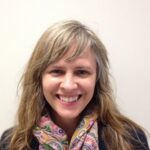 Department of Geography
Department of Geography
Sara Smith is a feminist political geographer interested in the relationship between territory, bodies, and the everyday. In her research she seeks to understand how politics and geopolitics are constituted or disrupted through intimate acts of love, friendship, and birth. She has worked on these questions in the Ladakh region of India’s Jammu and Kashmir state in relation to marriage and family planning. In collaboration with the GCPR she works on strategies to decolonize how methodology is taught in the university. She is also a founding member of the FLOCK feminist collective.
How did you start doing participatory research?
Before attending graduate school, Dr. Smith worked for a nonprofit women’s organization in Ladakh, India on counter globalization and sustainable development. Working with communities in this capacity, it never occurred to her as she began her academic trajectory to conduct research without community participation. As part of her doctoral dissertation on intimate lives and the desire for territory in Ladakh, Dr. Smith organized a Photovoice oral history project in which youth took pictures and conducted interviews with their previous generations to learn about inter-religious conflict and relationships. Though she was happy with this element of her doctoral project, as Dr. Smith wrote her dissertation, she struggled with the feeling that the written product may not be relevant to the women whose interviews informed it. This conviction that research should be not only participatory but also meaningful to the people she works with informs her current projects.
What are your current participatory projects?
Since 2011, Dr. Smith has collaborated with the Ladakh Arts and Media Organization (LAMO) and her former PhD student, Dr. Mabel Gergan, to study how marginalized Himalayan college students in India experience identity and citizenship. Arts-based participatory projects in this partnership have included an exhibition of college students’ video documentation of a year in their lives and a workshop led by Dr. Gergan in which students made a zine and wrote letters to their parents.
Dr. Smith is also writing and presenting with current and former students about the future and its potential to change our politics, drawing on Black studies, Indigenous studies, and queer of color critique. This close collaboration with her students exemplifies how her participatory lens extends beyond research and into teaching, mentorship, and service. She shares that prioritizing care and relationships is how she feels most comfortable working. At this stage in her career, she is also increasingly involved in advocating for institutional change and disrupting white supremacy in the academy.
What does participatory research mean to you?
Dr. Smith embraces a decolonizing approach to participatory research, insisting that scholars with privileged positioning cede some of their autonomy and authority back to the people they have taken it from. When teaching Decolonizing Methodologies for the GCPR, she highlights two key aspects of participatory research for graduate students to consider. First, it is important for researchers to know their limits and recognize that everything does not belong to them. Second, scholars should take the time to develop relationships with community members and ensure their research is in service to community goals.
“White people in the academy (must) giv(e) up some of their autonomy and some of their authority and cede that to people who they’ve taken it from. Anything that less than that might be participatory, but you can’t think about it as a move towards decolonization because you’re not actually making sure that indigenous people have more sovereignty.”